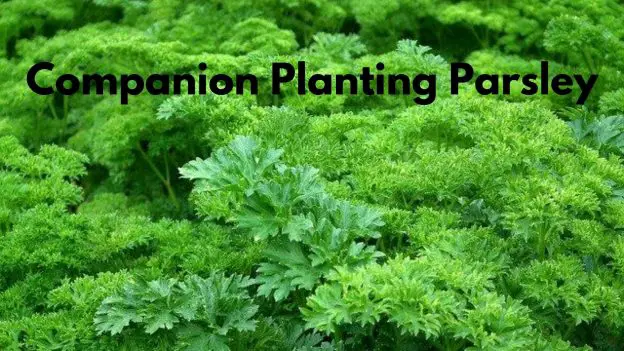Most plants either give or receive some benefit from being planted in companion with others. Not all plants, there are some exceptions but generally plants do better when planted together. Companion planting parsley is no exception so read on for what to grow with parsley and what not to grow with parsley.
Companion Planting Parsley
There are 2 main types of parsley, flat leaf parsley, and curly parsley. There are also 5 main varieties of parsley and all originated in Europe. Parsley is a biennial plant so it will give out it’s benefits for 2 seasons.
Don’t just take my word for it, follow this link to the University of Massachusetts paper.
Companion Planting Parsley-What To Grow With Parsley
Below are all the plants that do well with parsley, that’s all types of parsley.
Asparagus And Parsley

This perennial vegetable grows well in rich, fertile soil and will benefit from mulching during it’s dormant period. Parsley helps to deter the asparagus beetle, this pest feeds on the stem and foilage weakening the plant.
There is a mutual benefit to growing asparagus and parsley as companions. Both plants are enhanced when they’re grown together. For more information on companion planting asparagus follow this link.
Chives And Parsley
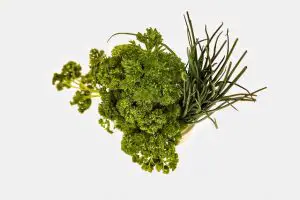
As parsley is a member of the same family as carrots, it can suffer from carrot root fly damage. By growing parsley in companion with chives you will help to disguise it as chives are very aromatic. There is a possibility of the parsley having stunted growth, but it will still grow.
Onions And Parsley
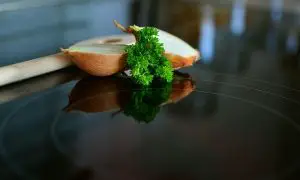
As carrots get root fly problems so do onions, the onion fly damages and eventually kills onions. Parsley grown in companion with onions will benefit both plants. Although alliums can cause stunted growth in parsley.
Carrots And Parsley
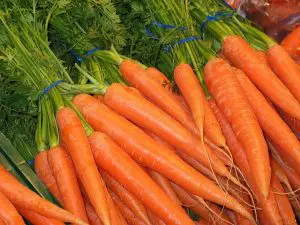
Members of the same family, and both susceptible to the carrot root fly, it’s best to grow parsley as a sacrificial plant allowing the root flies to attack the parsley, leaving your carrots damage free. Not a good idea planting these together if you want to save seed, due to cross pollination.
Roses And Parsley
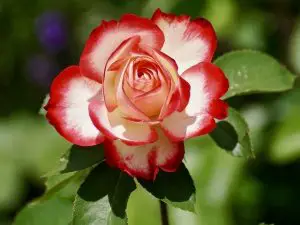
Growing parsley close to roses is said to enhance the scent of the roses. Allowing the parsley to flower will attract parasitic wasps which are useful in controlling rose pests. Parsley is also good at deterring the aphids that attack roses.
Tomatoes And Parsley
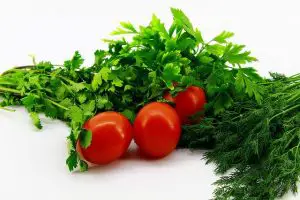
In some cases tomatoes seem to do better when grown in companion with parsley. This is not always the case however. Check how your plants are doing and treat accordingly.
If they are thriving leave them together, but if there are signs of the tomato plants struggling, move them away from the parsley. Unfortunately there is no data for which types benefit and which don’t.
Sweetcorn And Parsley
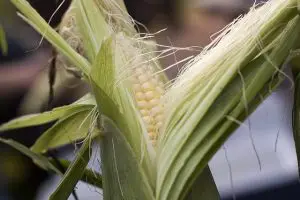
As anyone in the USA will tell you, sweetcorn is susceptible to earworm damage. Once parsley has flowered it attracts parasitic wasps which prey on the caterpillar of the earworm.
Beans And Parsley
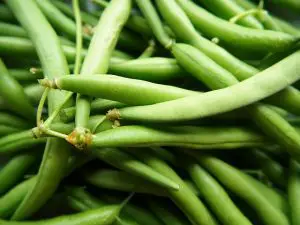
Cutworms are a common problem for bean plants, companion planting parsley with beans will help to control their numbers. The parasitic wasps and tachinid flies prey on the larvae of cutworms.
Peas And Parsley

The pests that damage bean plants will also attack peas, companion planting with parsley will attract the predators that are responsible for these attacks.
Brassicas And Parsley
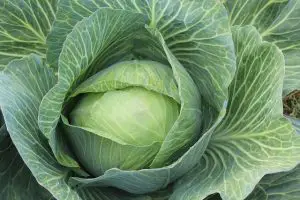
Cabbage white butterflies spend their lives looking for brassica plants(cabbage, cauliflowers, broccoli, etc…) to lay their eggs on. When they hatch they become caterpillars that are known in the USA as cabbage worms. Parsley attracts the beneficial insects that devour these pests.
Peppers And Parsley
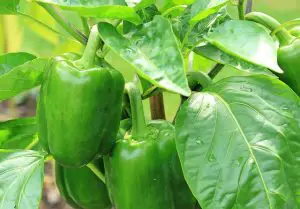
Pepper plants are susceptible to insect attacks and parsley grown in companion will help to keep these pests at bay. This includes chillies too.
Apple Trees And Parsley
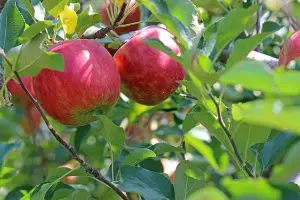
Codling moths are a serious problem for deciduous fruit growers, their larvae eat into the fruit making them inedible. Under planting with parsley will attract the predators that will keep these pests to a minimum. For more on companion planting apple trees follow this link.
Pear Trees And Parsley
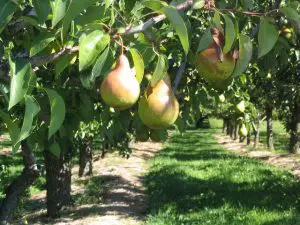
As with apples so with pears. The codling moth larvae are partial to pears too. Parsley grown in companion will help alleviate this problem. To find out more about companion planting pear trees follow this link.
Companion Planting Parsley-What Not To Grow With Parsley
There is only one type of plant that should not be planted with parsley, apart from some types of tomatoes(see above).
Mint And Parsley
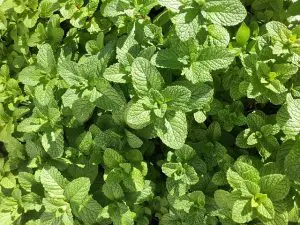
For some reason, if planted together, mint and parsley both struggle. This includes all members of the mint family. It’s best practise to keep these plants as far away from each other as possible.
What Does Parsley Attract?
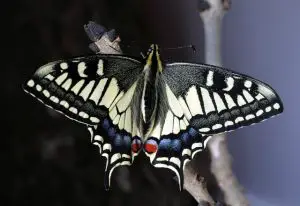
Parsley attracts many beneficial insects, like, bees hoverflies, swallowtail butterflies, butterflies, and parasitic wasps. Unfortunately, parsley also attracts hares, not so good if they are already a problem in your area.
Make A Repellent Tea Spray With Parsley

To make parsley tea, steep parsley leaves and stems in water for at least 72 hours, then strain into a spray bottle 3/4 full of water. Use spray to deter asparagus beetles, respray after heavy rain or watering.

